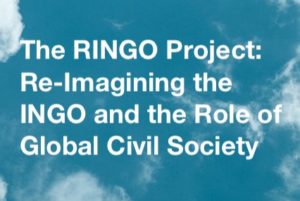A statement from the RINGO Project on the shutdown of USAID.
The news last week about a temporary halt to USAID expenditure, which represents a significant portion of all International Aid, will impact many civil society organisations throughout the world, including INGOs. Some analysts have argued that up to 40% of civil society organisations who are in receipt of USAID funding may close in the next few months if funding isn’t restored. Even more importantly the lives of millions of people that these funds support would be negatively affected. It is crucial to remember that behind these statistics are families, communities and grassroots organisations that rely on these funds to access healthcare, education, livelihoods and other essential services. The ripple effect of these cuts extends beyond numbers, it threatens the resilience and progress of vulnerable populations.
The RINGO Project express our solidarity with all of those impacted and know that this will be a difficult and unstable time for many people throughout the world, as the picture evolves. Many INGOs, in particular, have relied heavily on USAID funding, and we appreciate that their staff will be deeply worried about their partners, as well as their own livelihoods. This is a time to support our colleagues, wherever in the world they are, be it in the US, or anywhere in the majority world.
Unfortunately, the long-term trend towards a much-reduced Foreign Aid system has been coming for some time. USAID is not alone in cutting expenditure. Many other donors, including Swiss Aid, the Netherlands, Sweden and Australia, have all significantly reduced budgets in recent days and months. In this challenging environment, non-traditional donors such as philanthropic foundations, private sector actors, and regional funding initiatives have a critical role to play in filling the gaps. These actors must step up to provide flexible, accessible, and sustainable funding to ensure the continuity of vital programmes.
Whilst we have been working hard to build a system that shifts more power and resources to local civil society for the past few years, we recognise the importance of International Aid in this endeavour. The commitments of USAID’s previous administration to achieve 25% of funding going to local actors by 2030 was ambitious and much-needed. It also gave a welcome signpost to other donors to follow suit. A donor statement on locally-led development is now supported by 20 bilateral donors and multiple philanthropic actors in the US and Europe.
Given the sudden shift in policy to ‘America First’ we know that this target is unlikely to be reached, and that even existing local recipients may likely see their funding withdrawn beyond this current freeze. We urge donors who have endorsed the principles of locally-led development to not only maintain their commitments but to accelerate their efforts. This is an opportunity to demonstrate true leadership by championing funding models that prioritise local actors and minimise bureaucratic barriers.
At the same time, the Aid system has long been mired in compromise. Foreign policy approaches in many countries – not just the US – have often been accused of neo-colonialism and not always reflecting the real needs and independence of local people. Systems of accountability, risk management and barriers to funding were all prioritising international actors over local organisations. In RINGO, we want to see an Aid system that rebalances historical power imbalances. This principle recognises our shared responsibility, with governments, to a better world, as articulated in the Sustainable Development Goals. This requires that as civil society, we cede some collective power to those closest to the issues, and equally demands that we nourish civil societies everywhere so that they are well-resourced, independent and sustainable. In light of the recent announcement, we know that many civil society actors in the majority world are accelerating their approaches in this arena.
In this time of populism, conflict and climate crises it becomes even more critical that we re-imagine how civil society can be resourced and structured. For many who we work with throughout the world, this is a wake-up call to find alternative resourcing, both to enable equitable partnerships when we work with government and civil society, but also to be able to hold governments to account and contribute to building a better future. Our colleague Charles Kojo Vandyck has written a blog exploring the role of International Aid going forward. RINGO remains committed to supporting civil society working internationally, regionally and locally, to build the civil society we need, not the one that has evolved since WWII, overly dependent on Foreign Aid.
RINGO has a long-term aspiration to build a more equitable civil society, one in which power and resources are shared, as we work towards our common aims of health, well-being and justice for all, and we welcome anyone in civil society to join us in this endeavour. Our vision is one where locally-led development is not merely a principle but a reality. We seek to amplify the voices of local leaders, empowering them to shape the future of their communities on their terms. This is the civil society we aim to co-create: equitable, sustainable, and grounded in local realities.
Photo by Roth Melinda on Unsplash
